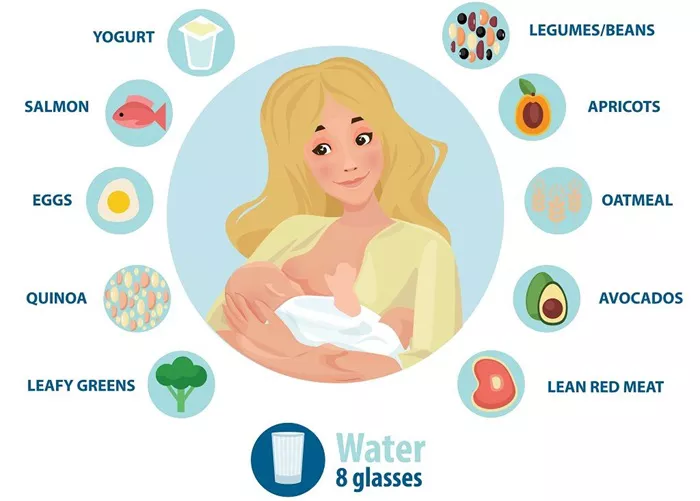A balanced diet is the cornerstone of good health, particularly for breastfeeding mothers. This involves a mix of proteins, whole grains, fruits, vegetables, healthy fats, and specific nutrients that support both the mother and baby’s well-being.
Protein-Rich Foods
Proteins are essential for tissue repair and growth, making them a vital part of a breastfeeding mother’s diet. Include a variety of protein-rich foods such as:
1.Lean Meat: Chicken, turkey, and lean cuts of beef or pork provide high-quality protein and important nutrients like iron.
2.Eggs: A versatile and excellent source of protein, vitamins, and minerals.
3.Dairy: Milk, yogurt, and cheese supply not only protein but also calcium and vitamin D.
4.Beans and Lentils: These are great plant-based sources of protein, rich in fiber and other essential nutrients.
5.Seafood: Opt for low-mercury options like salmon, tilapia, and shrimp, which are high in protein and omega-3 fatty acids.
Whole Grains
Whole grains are critical for providing sustained energy throughout the day. They are rich in fiber, vitamins, and minerals, which support digestive health and overall well-being.Examples Include: Brown rice, quinoa, whole wheat bread, oatmeal, and barley.
Fruits and Vegetables
A colorful array of fruits and vegetables ensures an adequate intake of vitamins, minerals, and antioxidants. These nutrients are vital for the immune system, skin health, and overall vitality.
1.Fruits: Berries, oranges, apples, bananas, and melons.
2.Vegetables: Leafy greens, carrots, bell peppers, broccoli, and sweet potatoes.
Healthy Fats
Healthy fats are essential for brain health and hormone production. They also help in the absorption of fat-soluble vitamins (A, D, E, and K).Sources: Avocados, nuts (almonds, walnuts), seeds (chia, flax), and olive oil.
Hydration: The Key to Milk Production
Staying hydrated is crucial for breastfeeding mothers, as it directly impacts milk production. Breast milk is about 90% water, so adequate fluid intake is necessary to maintain supply and ensure both mother and baby stay healthy.
1.Water: Aim to drink at least 8-10 glasses of water per day. More might be needed depending on activity level and climate.
2.Other Fluids: Herbal teas, milk, and natural fruit juices (in moderation) can also contribute to hydration.
Iron-Rich Foods: Preventing Anemia
Iron is essential for producing hemoglobin, which transports oxygen in the blood. Breastfeeding mothers need sufficient iron to prevent anemia, which can cause fatigue and weakness.Iron Sources: Lean meats, poultry, fish, beans, lentils, tofu, fortified cereals, and leafy greens like spinach and kale.
Omega-3 Fatty Acids: Supporting Brain Development
Omega-3 fatty acids, particularly DHA, are crucial for the neurological development of the baby and overall brain health of the mother
1.Oily Fish: Salmon, sardines, and trout are excellent sources. Aim for 2-3 servings per week.
2.Plant-Based Options: Flaxseeds, chia seeds, and walnuts can also contribute to omega-3 intake.
Calcium: Building Strong Bones
Calcium is vital for bone health, and breastfeeding mothers need to ensure they get enough to meet their own needs and those of their growing baby.
1.Dairy Products: Milk, cheese, and yogurt are rich sources.
2.Non-Dairy Options: Fortified plant milks (almond, soy), leafy greens, and almonds.
Vitamin D: Enhancing Calcium Absorption
Vitamin D works hand-in-hand with calcium to build strong bones and teeth. It also supports immune function and mood regulation.Sources: Sunlight exposure is the best natural source. Additionally, fatty fish, fortified dairy products, and supplements can help meet daily requirements.
Limiting Caffeine and Alcohol
While moderate caffeine consumption is generally considered safe during breastfeeding, excessive amounts can affect the baby’s sleep and behavior.
Caffeine: Limit intake to about 300 mg per day (roughly one to two cups of coffee).
Alcohol: If consumed, it should be done in moderation. It’s best to wait at least 2 hours per drink before breastfeeding to minimize its presence in breast milk.
Flavor Variation: Enhancing Baby’s Palate
Eating a variety of foods can introduce different flavors into breast milk, which may help in developing the baby’s taste preferences and acceptance of diverse foods later in life.
Practical Tips and Recipes for a Nutritious Diet
Maintaining a nutritious diet while breastfeeding can be challenging, but with a few practical tips and easy recipes, it can be manageable and enjoyable.
Meal Planning and Preparation
1.Plan Ahead: Prepare meal plans and grocery lists to ensure a variety of nutritious foods are always available.
2.Batch Cooking: Cook in batches and freeze portions to save time and ensure you always have healthy options ready.
Quick and Nutritious Recipes
1.Protein Smoothie: Blend together a cup of milk (or plant-based milk), a banana, a handful of spinach, a scoop of protein powder, and a tablespoon of flaxseeds.
2.Vegetable Stir-Fry: Sauté a mix of your favorite vegetables (like bell peppers, broccoli, and snap peas) with tofu or chicken in olive oil, and season with soy sauce and ginger.
3.Oatmeal Delight: Cook oats with milk, and top with sliced almonds, fresh berries, and a drizzle of honey.
Conclusion
A well-balanced diet rich in protein, whole grains, fruits, vegetables, healthy fats, and specific nutrients is essential for breastfeeding mothers. Staying hydrated, ensuring adequate intake of iron, omega-3 fatty acids, calcium, and vitamin D, and moderating caffeine and alcohol consumption are all critical aspects of maintaining health and supporting lactation. By incorporating these dietary principles and practical tips, breastfeeding mothers can nourish themselves and their babies effectively, setting the stage for healthy development and well-being.
Certainly, with thoughtful planning and mindful eating, breastfeeding mothers can enjoy a diverse and nutritious diet that supports their health and provides the best possible start for their babies.


